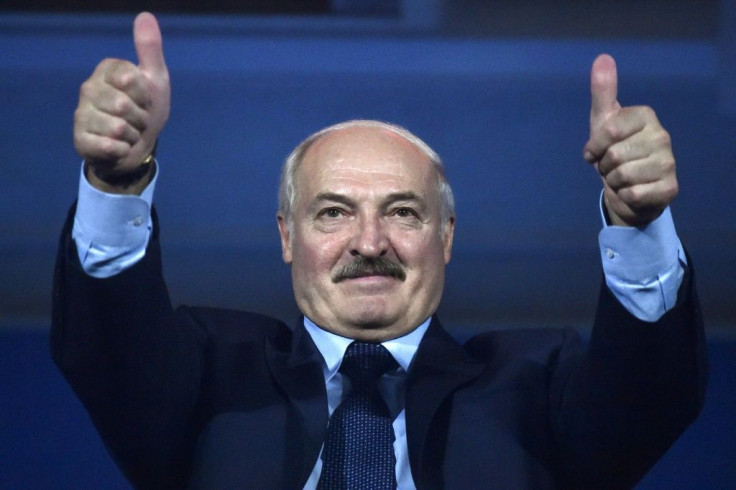Belarusian Opposition Figures, Candidates Detained Ahead Of Elections As Lukashenko Seeks Sixth Term

KEY POINTS
- Viktor Babaryko is a a former chief of Belgazprombank, a Belarusian unit of Russia's Gazprom
- Babaryko was arrested for illegally withdrawing large amounts of cash from bank accounts.
- The EU has condemned the detentions
The main challenger to the president of Belarus has been detained by authorities just ahead of national elections scheduled for August.
Viktor Babaryko, 56, a former banker and ex- chief of Belgazprombank, a Belarusian subsidiary of Russian energy behemoth Gazprom, was seeking to replace longtime President Alexander Lukashenko.
Babaryko was arrested on suspicion of financial crimes.
In response to Babaryko’s detention and the harassment of other opposition figures, thousands of people protested in the capital city of Minsk. Babaryko's 30-year-old son Eduard, who is managing his father’s campaign, was also arrested on suspicion of tax evasion. A prominent opposition lawmaker Mikola Statkevich was also recently jailed.
"Babaryko is detained because he was the organizer and leader of illegal activities [and he] tried to influence witness testimony," said Ivan Tertel, the head of the Committee for State Control, or KDK.
Tertel also accused Babaryko of collaborating with "puppeteers" from Moscow.
KDK also said Babaryko was arrested for illegally withdrawing large amounts of cash from bank accounts.
KDK head Ivan Tertel said that almost 20 employees of Belgazprombank had been arrested, claiming that some suspects "confessed" to illegally transferred hundreds of millions of dollars to Latvia through a scheme arranged by Babaryka.
Tertel also charged that the “big bosses at Gazprom and probably higher up” might have been involved in alleged violations at Belgazprombank.
The bank has been placed under administration.
Babaryko said the measures taken against Belgazprombank were part of an intimidation campaign conducted on “political orders.”
Reportedly, the two Babarykos are speaking to authorities without the presence of their lawyers.
Another opposition figure, Svetlana Tikhanovsky, wife of a popular YouTube personality named Sergei Tikhanovsky, who was recently jailed on charges of public disorder, is running for president in her husband’s place. She has received threats directed against herself and her children.
Lukashenko, who has ruled the country since July 1994, is seeking a sixth term in office. He is Europe’s longest serving leader. He has been repeatedly accused of intimidating and arresting opponents and clamping down on independent media. Not one of his prior election victories were deemed free and fair by western observers.
European Commission President Ursula von der Leyen condemned the arrests and demanded that "all arbitrarily detained" politicians and activists should be released.
The EU said it “strongly urges the Belarusian authorities to ensure a meaningful and competitive political contest.”
Peter Stano, a spokesman for the EU, asked that Belarus “refrain from any restrictions of the rights of potential candidates, avoid any detentions of peaceful protesters, and immediately release all arbitrarily detained activists.”
(Belarus is not a member of the EU).
As for Lukashenko, he claimed that he has prevented a foreign-backed revolution.
“We have managed to take steps to anticipate and thwart a major plan to destabilize Belarus… and bring a new Maidan [revolution] to the country,” he said, referring to the 2014 revolution in Ukraine. “The masks have been ripped off the puppets we have here and the puppet masters, who are sitting beyond Belarus’ borders.”
Lukashenko did not identify who the foreign conspiracists were.
Although Lukashenko has had shaky relations with Moscow, he accepted an invitation from Russian President Vladimir Putin’s to visit Moscow for the World War II victory parade on June 24.
Dmitry Peskov, a Kremlin spokesman, said Russia was unwilling to interfere in “an internal affair” of Belarus.
“The Kremlin doesn’t have its own candidate in the elections in Belarus,” he added.
On Friday, Lukashenko met with Russian Foreign Minister Sergei Lavrov in Minsk. The two parties said any problems they have can be resolved.
“If some hope to set us against each other and worsen our relationship, they will not succeed,” Lukashenko told Lavrov.
But Lukashenko himself may be vulnerable, Belarus, a country of 9.5 million, has one of the highest covid-19 infection rates in Europe. Lukashenko has ignored calls by the World Health Organization to impose protective social-distancing measures.
The country’s economy is also tanking.
The World Bank projected that the Belarusian economy will shrink by 4% this year.
“An increasingly larger part of Belarusian society is beginning to realize that Lukashenko’s opponents are in a majority,” said Andrei Yeliseyeu, a research director at the Warsaw-based EAST Center. “For many years Belarusian authorities were quite successful at creating a myth about Lukashenko’s electoral majority. Thanks to the growing popularity of new media… access to information among Belarusians has greatly improved.”
© Copyright IBTimes 2025. All rights reserved.




















